Thursday Feb 19, 2026
Thursday Feb 19, 2026
Wednesday, 4 April 2018 00:00 - - {{hitsCtrl.values.hits}}
 LONDON (Reuters): Britain’s buoyant manufacturing industry lost some steam in the first three months of 2018, according to a survey on Tuesday that suggested the economy remains on a slow but steady course a year ahead of Brexit.
LONDON (Reuters): Britain’s buoyant manufacturing industry lost some steam in the first three months of 2018, according to a survey on Tuesday that suggested the economy remains on a slow but steady course a year ahead of Brexit.
The IHS Markit/CIPS UK Manufacturing Purchasing Managers’ Index (PMI) inched up to 55.1 in March from a downwardly revised 55.0 in February, beating the 54.7 consensus forecast in a Reuters poll of economists.
But January’s reading was also revised lower and for the first quarter as a whole, the PMI was its lowest in a year, though above its average since Britain exited recession in the third quarter of 2009 following the financial crisis.
This suggested factory output rose at a quarterly rate of about 0.4% to 0.5%, slowing from 1.3% in the fourth quarter of 2017, IHS Markit said.
Manufacturing, which accounts for about 10% of Britain’s economy, was a relative bright spot late last year, when economic growth was the weakest among the Group of Seven rich nations.
The slowdown was due in large part to weaker consumer demand caused by higher inflation after June 2016’s Brexit vote knocked sterling lower.
A PMI published earlier on Tuesday showed growth in euro zone manufacturers slid to an eight-month low in March, although they continued to outpace their British peers. [EUR/PMIM]
Sterling and British government bonds were little moved by the figures.
“Despite the resilient March performance, the overall impression is that the manufacturing sector had a decent first quarter but has lost some momentum compared to the strong performance seen through the second half of 2017,” said Howard Archer, chief economic adviser to the EY ITEM Club consultancy.
At 55.1, the British factory PMI remains comfortably above its post-financial crisis average of 53.4.
“The outlook for manufacturing looks decent on the foreign demand side, but domestic conditions could prove challenging over the coming months,” Archer said.
The PMI’s new business index hit a nine-month low in March, marked by a tailing-off in growth in export orders — possibly reflecting sterling’s recent rally.
The pound has gained more than 4% against the U.S. dollar since the end of 2017.
A Confederation of British Industry survey last month also suggested growth in manufacturing moderated recently.
Tuesday’s PMI showed growth in cost pressures for factories and their selling prices cooled in March, something that may reassure Bank of England officials who are keeping an eye on inflation pressures.
Most economists polled by Reuters think the central bank will raise interest rates to a post-financial crisis high of 0.75% in May.
“With cost inflationary pressures also moderating to provide some respite for margins, the sector looks set to make further slow and steady progress as we head through the spring,” Rob Dobson, director at PMI compiler IHS Markit, said.
PMIs covering the construction and services sectors are due on Wednesday and Thursday.